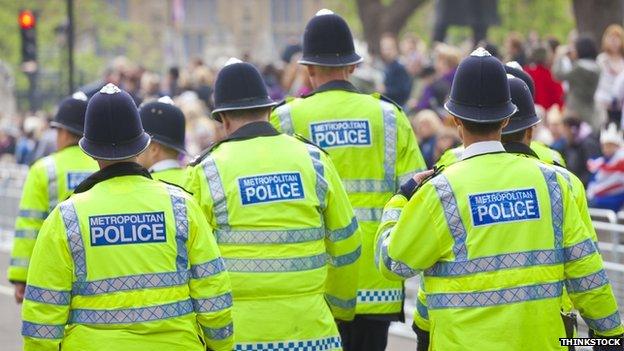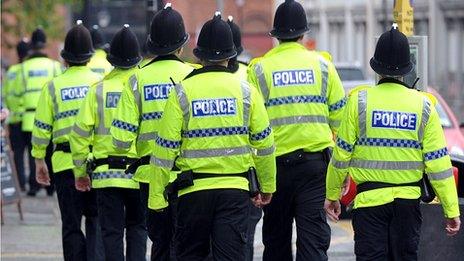A19 police retirement: 1,086 officers seek compensation
- Published

Hundreds of officers have been forced to retire since 2010
More than 1,000 former senior police officers are seeking compensation after being forced to retire under the controversial regulation A19.
The 1,086 were among 1,335 officers made to go after 30 years' service under the rule, used by 15 forces to make efficiency savings since 2010.
Payouts now rest on whether five forces win an appeal against a 2014 tribunal that ruled A19 was age discrimination.
Invoking the rule saved the forces more than £66m in wages, the BBC has found.
'Madhouse economics'
Some 830 of the claims were made after February 2014, when officers from five forces won an age discrimination claim.
Pension lump sums paid to the retired officers in England and Wales topped £157m, according to figures released to the BBC.
Those costs were covered by the national Police Pension Fund Account, not the individual police forces.
Labour's shadow policing minister Jack Dromey, who is MP for Erdington in the West Midlands, said: "The information the BBC has managed to elicit shows this looks like the economics of the madhouse.
"I don't blame the chief constables of these forces because they were put in an impossible situation by the biggest cuts to policing since the war.
"The consequences were that some of the best police officers were cut off in their prime.
"I cannot describe how bitter it was and it was absolutely wrong."

Mr Dromey said the personal impact for A19 officers was "immense"
In February 2014, the London Central Employment Tribunal ruled that 250 officers who were made to retire under A19 had suffered age discrimination
Under the A19 police regulation, those below chief officer rank could be required to stand down after 30 years "in the general interests of efficiency".
An appeal against that decision is due to be heard over three days at the Employment Appeal Tribunal from 11 March.
The BBC research hints at the scale of a multimillion-pound compensation bill that hinges on the outcome of the appeal.
None of the 15 forces said they held information about the total amount of compensation being claimed by the officers in the event of the appeal being rejected.
'Last resort'
West Midlands Police - the second largest force in the country behind the Met - revealed it was facing 498 claims after forcibly retiring 591 officers at a cost of £71.35m in pension lump sums.
A force spokeswoman said: "While the outcome of the Employment Appeal Tribunal is awaited, it would be inappropriate for us to comment further or speculate about compensation payouts."
The Staffordshire and South Wales forces have both received more claims than the number of officers forced to retire.
South Wales director of human resources, Mark Milton, said: "The force was already undertaking redundancies amongst police staff, we had a recruitment freeze in place and cuts had been made to non-staff budgets.
"There was no alternative; A19 was the last resort to meet the immediate savings targets."

Timeline to forced retirements
October 2010: Government says it is cutting police funds following a spending review.
November 2010: Surrey Police becomes the first force in England to use A19 in a bid to cut costs.
July 2013 - The High Court rules A19 was "not unlawful".
February 2014 - Officers forced to retire from five forces - Nottinghamshire, West Midlands, Devon and Cornwall, North Wales and South Wales - win an age discrimination claim.

A Home Office spokesperson said: "While we acknowledge that the police funding settlement is challenging, Her Majesty's Inspectorate of Constabulary has found the police are successfully meeting the challenge of balancing their books while protecting the front line and delivering reductions in crime.
"It is for chief officers, working with police and crime commissioners, to take operational decisions about the use of resources, including whether the use of Regulation A19 is appropriate for their force."
BBC News Online sent requests under the Freedom of Information Act to the 43 forces in England and Wales. 28 forces said they did not use A19.
- Published5 February 2014

- Published25 July 2013

- Published4 March 2013

- Published14 February 2013

- Published23 January 2013

- Published29 March 2011